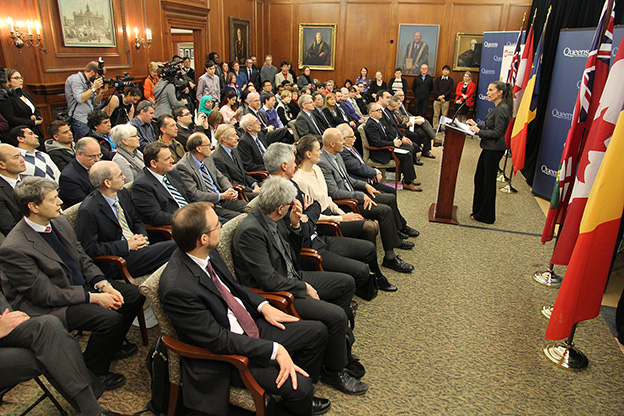Multi-university clean energy project awarded $4-million NSERC grant

An international research project based at Queen’s University in conjunction with McMaster University and several other institutions that is focused on developing new clean energy technologies has received a $4-million grant from Natural Sciences and Engineering Research Council of Canada.
The Engineered Nickel Catalysts for Electrochemical Clean Energy (Ni Electro Can) research team, led by Queen’s researcher Gregory Jerkiewicz (Chemistry), in partnership with McMaster’s Gianluigi Botton and others, will use the NSERC Discovery Frontiers grant to develop the next generation of nickel-based materials, which will give Canada’s energy sector a competitive advantage. The grant is only given to one project once every two years.
McMaster’s Canadian Centre for Electron Microscopy, which is led by Botton, will be instrumental in examining and characterizing materials at the atomic level during the project.
“Congratulations to Dr. Jerkiewicz and his team,” said the Honourable Kirsty Duncan, Minister of Science. “This Discovery Frontiers announcement is a great example of the government’s commitment to fundamental, discovery-driven research that addresses significant scientific problems and opens new horizons. The Government of Canada is committed to strengthening its support for fundamental research that can create better tomorrows for Canadians.”
The research team aims to create affordable, alkaline fuel cells for the production of energy; develop new technologies for hydrogen-based energy storage; and transform glycerol into value-added chemicals that will make biodiesel production cheaper and greener.
“The participation of McMaster in the project confirms the important role the CCEM plays for Canadian materials researchers in order for them to become more competitive at the national and international level,” said Botton, Professor in Materials Science and Engineering and co-applicant in the Ni-Electro-Can network. “This key role has been clearly recognized by the international expert panel that evaluated the grant. In other words, the top researchers in Canada want to work with the CCEM.”
Currently, fuel cells employ acidic electrolytes, which are expensive because they require platinum catalysts. The Ni Electro Can team is developing nickel materials that will be used in new alkaline fuel cell technologies, making them cheaper to build. The new nickel materials will also find application in alkaline water electrolyzers, thus making this technology more energy efficient. The new fuel cells and alkaline water electrolyzers will assist Canada in transitioning to the hydrogen economy.
“Canada faces challenges associated with declining reserves of non-renewable energy sources, environmental pollution, greenhouse gas production and related societal issues,” Dr. Jerkiewicz says. “Building on Canada’s strengths in the nickel, water electrolysis and fuel cell sectors, this project will lay the foundation for Canadian leadership in the next generation of electrochemical clean energy technologies.”
Ni Electro Can includes 14 Canadian researchers, seven universities (University of Victoria, Simon Fraser University, INRS Université de Recherche, University of Toronto, Ottawa University and McMaster University), nine international researchers from seven countries, and a number of industry partners.

